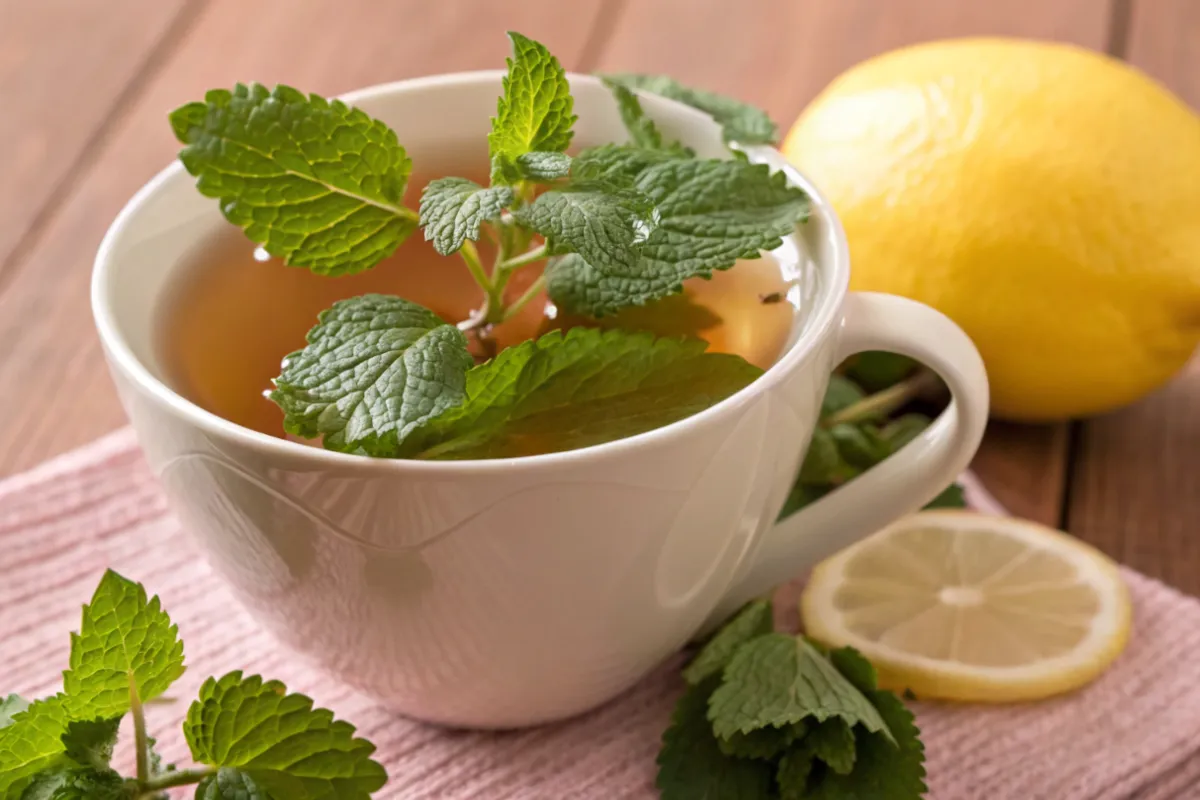How To Make Lemon Balm Tea For Weight Loss Recipe

Imagine the sun-drenched herb garden, the air thick with the sweet, lemony scent. Bees hum lazily around the vibrant green foliage. A gentle breeze rustles the leaves of a plant known for centuries for its calming and restorative properties: lemon balm. This unassuming herb, often overlooked, holds a secret weapon in the quest for well-being, particularly for those seeking a natural aid in weight management.
This article will guide you through crafting your own lemon balm tea, unlocking its potential benefits for weight loss and overall health. We'll delve into the science behind this fragrant brew. You'll also learn a simple recipe and explore ways to incorporate it into your daily routine.
The Ancient Wisdom of Lemon Balm
Lemon balm, scientifically known as Melissa officinalis, boasts a rich history stretching back to ancient Greece and Rome. It wasn't merely a culinary herb, but a cherished remedy. It was used to soothe anxiety, improve sleep, and even aid digestion.
Its name, Melissa, is derived from the Greek word for "honeybee." This is a testament to its allure for pollinators and its association with sweetness and well-being. Traditional herbalists have long recognized its potent medicinal properties.
Unlocking the Weight Loss Potential
While not a magic bullet, lemon balm tea may offer several benefits that indirectly support weight loss. These benefits are backed by preliminary research and traditional use. They include stress reduction, improved sleep, and better digestion.
Stress Reduction: Chronic stress can lead to elevated cortisol levels. This in turn can trigger cravings for sugary and fatty foods and promote abdominal fat storage. Lemon balm's calming properties may help mitigate these effects, promoting a healthier approach to eating.
A 2017 study published in the journal Nutrients suggests that lemon balm extract can improve mood and cognitive performance. This indicates a potential to help manage stress-related eating behaviors. Lower stress levels can positively impact weight management.
Improved Sleep: Adequate sleep is crucial for metabolic health and weight regulation. Sleep deprivation can disrupt hormones that control appetite, leading to increased hunger and decreased satiety. Lemon balm has a long-standing reputation as a sleep aid, promoting relaxation and reducing insomnia.
A systematic review in the journal Complementary Therapies in Medicine analyzed several studies and concluded that lemon balm could improve sleep quality. Better sleep means better hormonal balance which contributes to weight management.
Better Digestion: Lemon balm is believed to possess mild digestive properties. These properties can help alleviate bloating and indigestion. A healthy digestive system is essential for nutrient absorption and efficient metabolism, both of which play a role in weight management.
The Perfect Lemon Balm Tea Recipe
Creating lemon balm tea is a simple and rewarding process. You'll need fresh or dried lemon balm leaves, hot water, and optionally, a touch of honey or lemon to enhance the flavor. Opt for organic lemon balm whenever possible to avoid exposure to pesticides.
Ingredients:
- 1-2 teaspoons of dried lemon balm leaves or 2-3 tablespoons of fresh lemon balm leaves
- 1 cup of boiling water
- Optional: Honey or lemon to taste
Instructions:
Step 1: Gently crush the lemon balm leaves to release their aromatic oils. This will maximize the flavor and therapeutic benefits of the tea.
Step 2: Place the crushed leaves in a tea infuser or teapot. This prevents the leaves from floating freely in the water and making the tea cloudy.
Step 3: Pour boiling water over the leaves and let steep for 5-10 minutes. Steeping time affects the strength and flavor of the tea. Experiment to find your preferred brewing time.
Step 4: Remove the tea infuser or strain the tea into a cup. This will separate the leaves from the liquid, leaving you with a clear and flavorful tea.
Step 5: Add honey or lemon to taste, if desired. Honey adds sweetness and antioxidants. Lemon enhances the citrusy flavor of the tea.
Incorporating Lemon Balm Tea into Your Routine
For optimal benefits, consider incorporating lemon balm tea into your daily routine. Enjoy a cup in the evening to promote relaxation and improve sleep. You can also drink it after meals to aid digestion.
Start with one cup per day and gradually increase as needed. Pay attention to your body's response and adjust accordingly. It's essential to listen to your body and adjust the frequency as needed.
Caution: While generally safe, lemon balm can interact with certain medications, particularly those for thyroid conditions or anxiety. Consult with your doctor before using lemon balm tea regularly, especially if you have any pre-existing health conditions or are taking medications.
Pregnant or breastfeeding women should also consult their doctor before consuming lemon balm tea. Individual responses to herbal remedies can vary.
Beyond the Cup: Other Uses for Lemon Balm
Lemon balm's versatility extends beyond tea. The fresh leaves can be added to salads, soups, and sauces for a burst of lemony flavor. It also makes a wonderful addition to homemade skincare products.
Lemon balm essential oil is often used in aromatherapy to promote relaxation and reduce stress. You can find creams with lemon balm extract used to treat cold sores as well.
A Gentle Path to Well-being
Lemon balm tea is a gentle and natural way to support your weight loss journey. It works by addressing underlying factors such as stress, sleep deprivation, and digestive issues. This makes it a valuable addition to a holistic approach to well-being.
Remember that sustainable weight loss involves a balanced diet, regular exercise, and healthy lifestyle habits. Lemon balm tea can complement these efforts, providing a soothing and supportive element to your overall plan.
As you sip your warm cup of lemon balm tea, take a moment to appreciate the simple pleasures in life. The fragrant aroma, the calming effect, and the potential benefits for your health. Embrace the power of nature and nurture your well-being, one cup at a time.


















